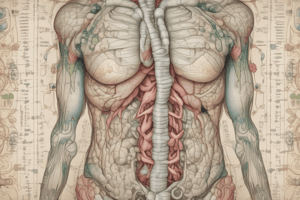Podcast
Questions and Answers
Which hormone is produced by the thyroid gland and plays a role in cognitive function?
Which hormone is produced by the thyroid gland and plays a role in cognitive function?
The adrenal glands produce which type of hormone that is involved in the stress response?
The adrenal glands produce which type of hormone that is involved in the stress response?
Which hormone produced by the pancreas is responsible for regulating blood sugar levels?
Which hormone produced by the pancreas is responsible for regulating blood sugar levels?
Which reproductive organ produces the sex steroid progesterone?
Which reproductive organ produces the sex steroid progesterone?
Signup and view all the answers
Which endocrine disorder is characterized by an excess production of cortisol?
Which endocrine disorder is characterized by an excess production of cortisol?
Signup and view all the answers
What is the primary function of the pituitary gland within the endocrine system?
What is the primary function of the pituitary gland within the endocrine system?
Signup and view all the answers
Which of the following hormones is NOT produced by the pituitary gland?
Which of the following hormones is NOT produced by the pituitary gland?
Signup and view all the answers
How do hormones produced by the endocrine system typically influence the body's functions?
How do hormones produced by the endocrine system typically influence the body's functions?
Signup and view all the answers
Which of the following endocrine glands is responsible for producing hormones that regulate the body's stress response?
Which of the following endocrine glands is responsible for producing hormones that regulate the body's stress response?
Signup and view all the answers
What is the primary role of the endocrine system in the human body?
What is the primary role of the endocrine system in the human body?
Signup and view all the answers
Study Notes
Understanding Hormones and the Endocrine System
Overview
Hormones are chemical messengers produced by specialized cells called endocrine glands. These messengers play crucial roles in various bodily functions, such as growth, development, metabolism, sexual function, reproduction, and mood regulation. The major endocrine glands include the pituitary, pineal, thymus, thyroid, adrenal glands, and pancreas, with additional hormone production occurring in the testes for males and ovaries for females. Hormones work slowly over time and have significant impacts on cellular processes and whole body function. Abnormal levels of hormones can lead to serious health issues.
Endocrine System Structure and Functions
The endocrine system is responsible for producing and regulating hormones. It consists of several organs that produce different types of hormones, which are then released into the bloodstream to reach their target cells throughout the body. These hormones help regulate specific physiological functions such as growth, development, metabolism, sexual function, reproduction, and mood.
Organs and Their Hormones
Pituitary Gland
Located at the base of the brain, the pituitary gland is often referred to as the "master gland." It controls other glands' functions by releasing various hormones, including growth hormone, prolactin, follicle-stimulating hormone (FSH), luteinizing hormone (LH), and thyroid-stimulating hormone (TSH).
Thyroid Gland
The thyroid gland produces three main hormones: triiodothyronine (T3), thyroxine (T4), and calcitonin. These hormones play essential roles in growth and development, maintaining metabolism, and contributing to cognitive function.
Adrenal Glands
Situated above the kidneys, the adrenal glands produce corticosteroids, catecholamines (such as epinephrine and norepinephrine), and mineralocorticoids like aldosterone. These hormones play crucial roles in stress response, blood pressure regulation, and immune system function.
Pancreas
Part of both the digestive and endocrine systems, the pancreas secretes hormones like insulin and glucagon to regulate blood sugar levels. It also produces digestive enzymes that help break down food in the small intestine.
Gonads (Testes for Males, Ovaries for Females)
These reproductive organs produce sex steroids such as testosterone, estrogen, and progesterone. These hormones play significant roles in sexual development, function, and reproduction.
Hormone Regulation and Diseases
Hormonal regulation is complex and involves various physiological mechanisms, including feedback loops between glands and target cells. Disruptions in this delicate balance can lead to endocrine disorders. Some common diseases include hypothyroidism, hyperthyroidism, Cushing's syndrome, Addison's disease, diabetes, and polycystic ovary syndrome (PCOS).
In summary, hormones are essential chemical messengers produced by the endocrine system, playing vital roles in growth, development, metabolism, sexual function, reproduction, and mood. Understanding their structure, functions, and regulation is crucial for maintaining health and treating related disorders.
Studying That Suits You
Use AI to generate personalized quizzes and flashcards to suit your learning preferences.
Description
Explore the functions and structures of the endocrine system, including major glands like the pituitary, thyroid, adrenal, pancreas, and gonads. Learn about hormone regulation, common diseases, and the vital roles hormones play in growth, development, metabolism, sexual function, reproduction, and mood.




